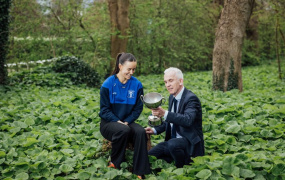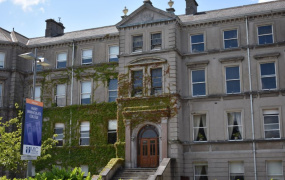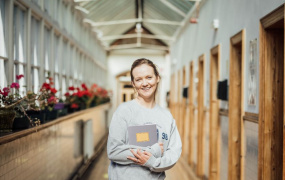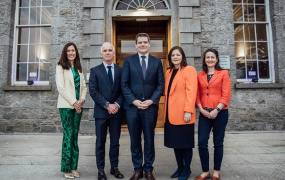German Studies
About
German can be taken as part of the MIC Arts Degree as a joint honours combination.
You are someone who enjoys learning about other cultures, who is interested in languages as well as literature, film, art, current affairs and history. You would either like to continue with German because you liked it in school or you may want to pick it up as a beginner who is happy to get a chance to start learning German. Perhaps you are someone who wants to benefit from the excellent job prospects for anyone with a good knowledge of other EU languages and of German in particular. And you know that German is one of the major languages of the European Union and the most common first language spoken by people within the European Union.
German Studies at MIC not only includes language learning, but also offers a different perspective on European media, film, literature, history and different cultures and provides students with skills much needed today. The Department of German Studies offers an exciting and wide-ranging language programme that enables students to excel in their language and intercultural skills, be it as beginners or advanced German students. The Department provides a friendly and supportive learning environment, which allows for small group work and innovative approaches to language teaching.
German is the first language of more than 100 million people in Germany, Austria and parts of Switzerland and is spoken in Eastern Europe and Northern Italy. It offers access to the rich and diverse cultural heritage of many countries at the heart of Europe and is also a very important medium of communication for international business and trade. German can be studied at both beginner and advanced level at MIC. Students who did not do German for their Leaving Certificate can take German for beginners in first year, before joining other German students in second year. Bridging tutorials are offered for those ab inito students who decide to continue with German in Year Two.
Teaching and learning in the Department of German Studies has many facets (from debates on current affairs and 'Teaching German' workshops to film screenings and linguistics) and the German programme is concerned with both German language and culture. Substantial language practice, such as writing, oral, aural practice and CALL (Computer Assisted Language Learning), at basic and advanced levels is provided throughout the course. Students are introduced to aspects of history, social structure, ideology, contemporary culture and politics, etc., as expressed in literature, film and print media. The theory and practice of second-language acquisition and language teaching methodology are integral parts of the Linguistics module. By learning German, students gain access to another, very diverse culture and acquire intercultural/transnational communication skills that are needed in our multicultural and increasingly globalised society. Students who choose this subject are normally required to spend at least one semester during their third year in a German-speaking country.
German graduates find work in a wide range of careers, including:
- International Business
- European and Irish public service
- Journalism
- PR and Marketing
- Arts and Cultural Institutions
- Translating and interpreting
- Teaching (Professional Master of Education required)
- Tourism
- MA/PhD Research
- About







